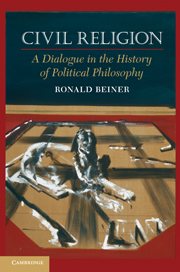Book contents
- Frontmatter
- Contents
- Preface and Acknowledgments
- Introduction
- Part I Machiavelli, Hobbes, Rousseau
- Part II Responses to (and Partial Incorporations of) Civil Religion within the Liberal Tradition
- 9 Baruch Spinoza
- 10 Philosophy and Piety
- 11 Spinoza's Interpretation of the Commonwealth of the Hebrews, and Why Civil Religion Is a Continuing Presence in His Version of Liberalism
- 12 John Locke
- 13 “The Gods of the Philosophers” I
- 14 Bayle's Republic of Atheists
- 15 Montesquieu's Pluralized Civil Religion
- 16 The Straussian Rejection of the Enlightenment as Applied to Bayle and Montesquieu
- 17 “The Gods of the Philosophers” II
- 18 Hume as a Successor to Bayle
- 19 Adam Smith's Sequel to Hume (and Hobbes)
- 20 Christianity as a Civil Religion
- 21 John Stuart Mill's Project to Turn Atheism into a Religion
- 22 Mill's Critics
- 23 John Rawls's Genealogy of Liberalism
- 24 Prosaic Liberalism
- Part III Theocratic Responses to Liberalism
- Part IV Postmodern “Theism”
- Conclusion
- Index
- References
9 - Baruch Spinoza
From Civil Religion to Liberalism
Published online by Cambridge University Press: 05 June 2012
- Frontmatter
- Contents
- Preface and Acknowledgments
- Introduction
- Part I Machiavelli, Hobbes, Rousseau
- Part II Responses to (and Partial Incorporations of) Civil Religion within the Liberal Tradition
- 9 Baruch Spinoza
- 10 Philosophy and Piety
- 11 Spinoza's Interpretation of the Commonwealth of the Hebrews, and Why Civil Religion Is a Continuing Presence in His Version of Liberalism
- 12 John Locke
- 13 “The Gods of the Philosophers” I
- 14 Bayle's Republic of Atheists
- 15 Montesquieu's Pluralized Civil Religion
- 16 The Straussian Rejection of the Enlightenment as Applied to Bayle and Montesquieu
- 17 “The Gods of the Philosophers” II
- 18 Hume as a Successor to Bayle
- 19 Adam Smith's Sequel to Hume (and Hobbes)
- 20 Christianity as a Civil Religion
- 21 John Stuart Mill's Project to Turn Atheism into a Religion
- 22 Mill's Critics
- 23 John Rawls's Genealogy of Liberalism
- 24 Prosaic Liberalism
- Part III Theocratic Responses to Liberalism
- Part IV Postmodern “Theism”
- Conclusion
- Index
- References
Summary
He [Hobbes] told me he [Spinoza] had cut through him a barre's length, for he durst not write so boldly.
– John AubreyWe see that nearly all men parade their own ideas as God's Word, their chief aim being to compel others to think as they do, while using religion as a pretext.
– Baruch SpinozaSpinoza was writing the Theological–Political Treatise at around the same time that Hobbes was composing Behemoth. What the experience of the English Civil War had taught Hobbes was that it was time to put the churches out of business, at least with respect to their political ambitions. But Behemoth, for all the stridency of its anticlericalism, was a rather tame contribution to reflection on the relationship between religion and politics compared with the explosiveness of Spinoza's challenge to biblical religion. Hobbes (and later Locke) completely deferred to Scripture as an absolutely authoritative text, with an authority equal to that of reason. For Spinoza, by contrast, this authority is entirely subject to the superior authority of reason, and it does not stand up well to rational scrutiny.
Spinoza's core insight is that, although Hobbes's determination to subordinate religious authority to the domain of civil authority was a move in the right direction, the theocratic conception of political life had to be challenged much more radically than Hobbes was able to grasp. That is, liberalism, not civil religion, is the appropriate response to theocracy. (Arguably, the doctrine of right = power in the early chapters of the Political Treatise is incompatible with any coherent version of liberalism. Rather than attempt to find a way around this hugely difficult problem in Spinoza's political philosophy, in what follows I will largely ignore this central teaching of the Political Treatise – even though aspects of the problem are present in the Theological–Political Treatise as well.)
- Type
- Chapter
- Information
- Civil ReligionA Dialogue in the History of Political Philosophy, pp. 87 - 112Publisher: Cambridge University PressPrint publication year: 2010

